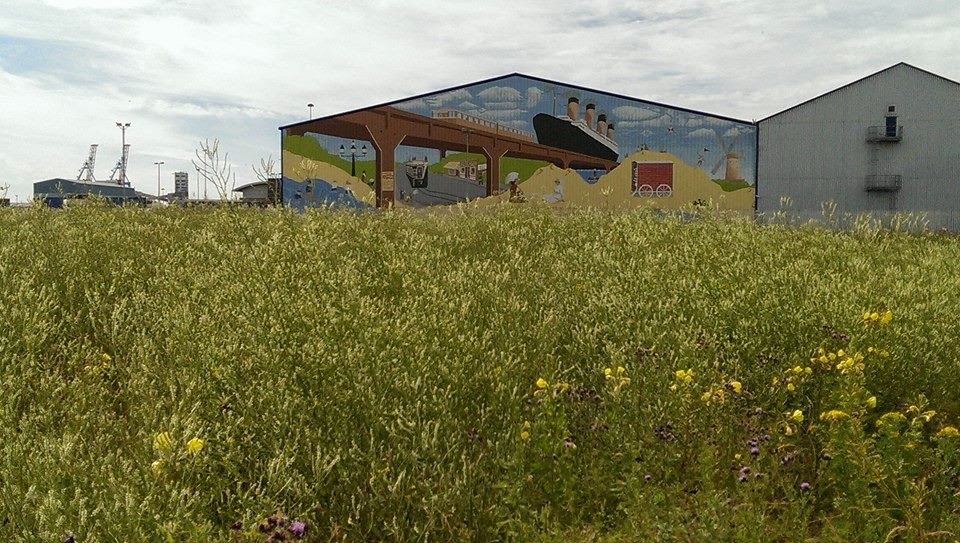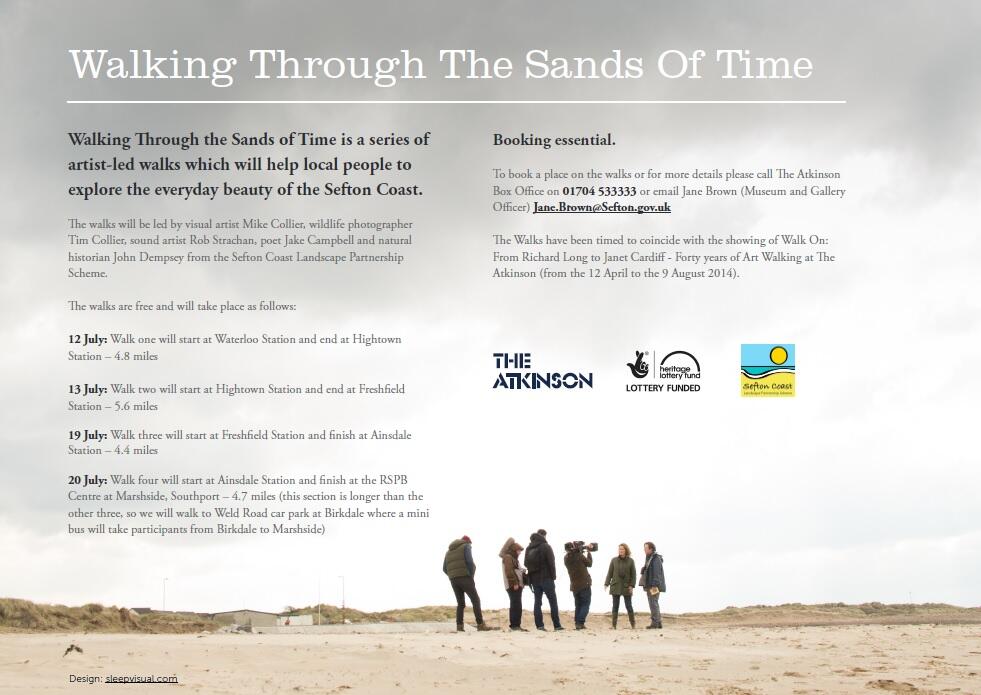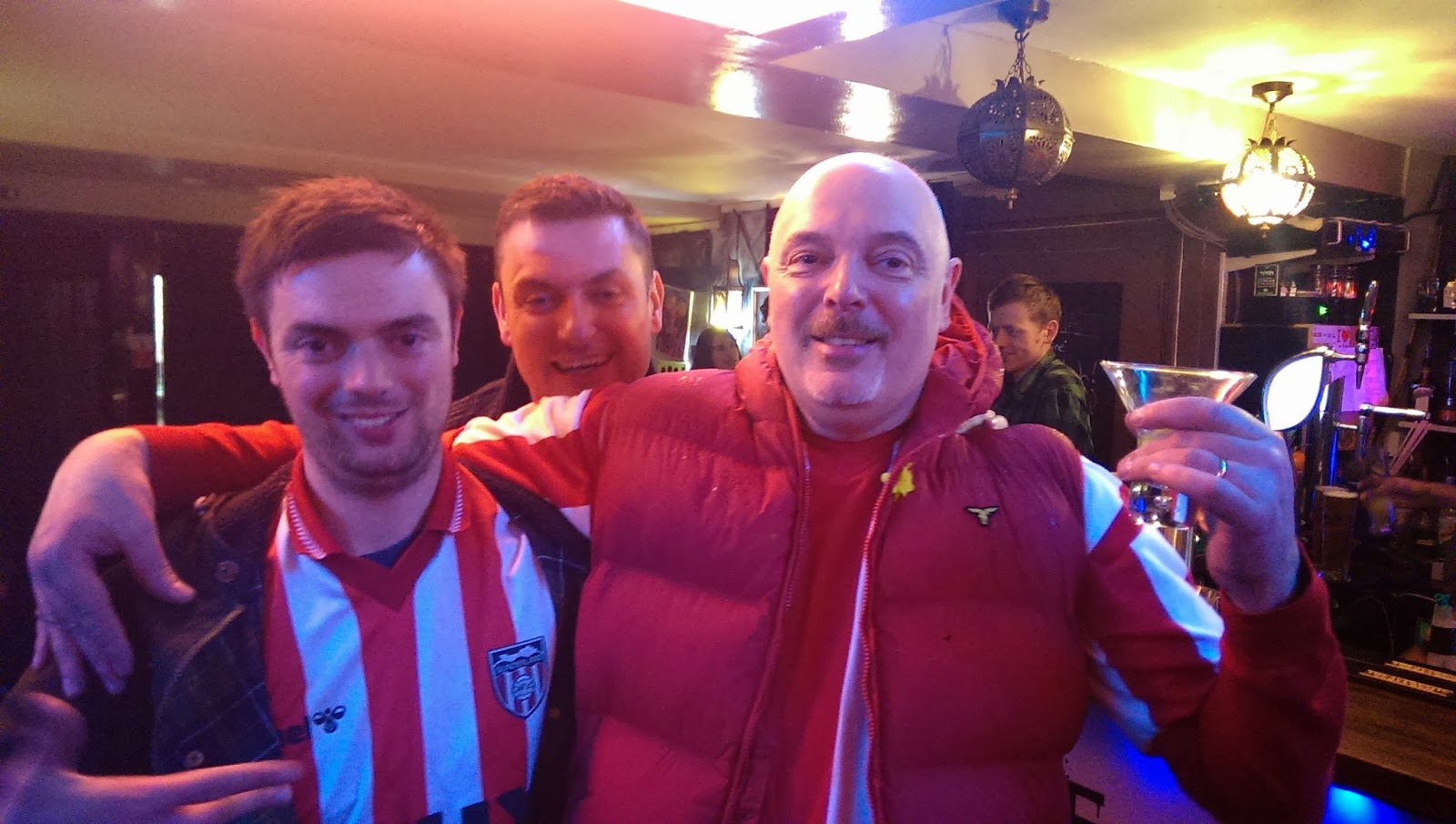 |
| 'Mussel Wreck', provenience unknown |
“For us
to live and die properly, things have to be named properly. Let us reclaim our
words.”
-
John
Berger
Ragwort;
Sorrel; Seaforth Docks; Horsetail; Sea Holly; Gatekeeper butterfly; Seaforth
and Litherland; Sea Plantain; Dune Helleborine; Kirkdale; Bootle New Strand;
Ainsdale; Alt; Rest Harrow; Dove’s-foot Cranesbill; Dark Green Fritillary;
Ravenmeols Dunes; Myxomatosis; Sea Kale; Yellow Rattle; Ionic Star.
These are
just some of the many pronouns that
have been rattling around inside my head while walking between Liverpool and
Southport. New words; words I’d not heard in a long, long time; words I’d never
heard before.
It
started on the train line: the Merseyrail from Chester to Moorfields on the
Wirral Line, then on the Northern Line up to Waterloo, Hightown, Freshfield...
New places; unfamiliar names. The strangeness of holding a railway line’s worth
of places in your head: Hooton, Capenhurst, Rockferry. Wondering what the
‘Rake’ suffix – Eastham Rake, Bromborough Rake – means. The comparing the
places to those on the Metro line: Fellgate, Pelaw, Heworth... Green Lane,
Birkenhead Central, Hamilton Square; Hebburn, Jarrow, Bede. Bede so named
because the famous scholar was born on the banks of the Tyne at Jarrow, or
‘Jarra’, if you’re using its colloquial name. Fellgate, because it borders
Gateshead, where trees were felled to make room for new Tyneside hovels.
Hebburn, misspelled, because they meant to call it ‘Heaven’, and it’s up there,
opposite giant cranes and vestigial docks, above the Tyne, which has went 180,
most improved river, abundant in Salmon.
But these
new words, these new places, these new flowers and birds, what do they mean? A
litany of names: some understood, others strange and new and spoken in an
unfamiliar tongue: Scouse, that pseudo Irish lilt, a million miles from
Geordie, but also not so different at the same time. Northern, warm, specific.
I have friends who’ve had and/or wanted elocution lessons: to lose their
regional accents. I’ve known people to vilify the Geordie and Scouse accents –
and others – but what does a droll, RP monotone say of where you’re from; of
what you’ve seen, known and done; of how you identify with the world and give
it your own personal inflection, the idiosyncrasies of what it means to belong
to where you belong?
 |
| On Ainsdale Sands |
A
tangent. Where was I? Sefton, with its huge horizons, its East Anglian-esque
endless skies. Walking. At Ainsdale we find shipwrecks, swallowed by the
shifting sands. The Ionic Star, The Pegu, The Mussel Wreck (real name unknown, identified tokenistically by
its skin of shellfish). We philosophise on the gas rig and the wind farms out
in the Irish Sea. Power. Fuel. Nuisance. They spoil the view of the Gormley
statues but they keep the lights on, the cookers cooking, so we tolerate them,
and we debate as to how green they really are, how big their footprint is,
their effect on birds and fish. We discuss jetsam: the plastic bags that
turtles think are jellyfish, autopsies revealing Tesco carriers in the guts of
the choked beasts. Poor buggers, but we like our supermarkets. Convenience. We
worry that if the high tide line is anything to go by, the rest of the sea must
be a mess: plastics floating on and on; oil tankers cleaned out in the sea, so
long as they’re over 12 miles off the coast, because we like oil, or oil
companies like clean tankers, and we like petrol and petrochemicals, and it’s a
story, and this coast is a story, but not just one: hundreds, thousands,
sometimes present when a storm moves the sands the right way, sometimes hidden,
forgotten.
We find
Common Crabs, Sea Potatoes, Dead Men’s Fingers and Mermaid’s Purses. We find an
Ocean Quahog, thought to be one of the longest living organisms on the planet.
Time glacial; time the click of fingers. “You’ll carve your names into the
Paupack cliffs”, wrote The Menzingers, “to read them when you get old enough to
know/that happiness is just a moment.” Boom. One of the best lyrics ever
written, because it’s true.
We find
ancient footprints in the mud slacks. Children who played here, when this was a
lagoon and you could walk to North Wales, 6,000 years ago. Prints of deer
hooves. Prints of Aurochs, huge, primeval cows, thought to grow up to 11 feet
high, extinct now. Gone from memory and biology but their marks remain, at low
tide, when the wind is right.
At
Ainsdale we pass the hollowed-out husk of the old Toad Hall nightclub: memories
of fumbling in the dry ice, first pints of lager. Southport beach, made famous
for its raves; its west coast sunsets; Californication with Mad-chester pill
heads. Waking up in the dunes to the sound of the sea lapping at the shore. The
Toxteth riots, 81’. Ten years later, Meadow Well: a North Shields council
estate, the same sort of things: heat, fury, heroin; injustice, racism, resentment.
We think of a few summers back: Britain baking under a July heatwave; Sports
Direct looted; cars ablaze. Another story, but the wrong one, the narrative out
of kilter. Nothing to hang on to, so why the fuck not?
 |
| Jetsam glove |
Another
walk: Whiteleas, South Shields, led by Mike Collier – turfs reversed: me back
on my home soil, him away from his native Crosby – and natural historian Keith
Bowey, the old Sunderland to South Shields railway bright with Rosebay
Willowherb. The kids coming up to us on their bikes, screaming: “Mista, mista,
there’s a dead man!” Thirty-odd, Adidas-clad, slumped on the steps from the
John Reid Road down to the old railway line. Evidently been on it all day.
Comatose. Proper paralytic, like, but breathing, alive, just. “Aa just wanna
sleep it off” The kids’ odd delight at finding him, and finding him not deed.
The sadness of the situation: wrecked at 6pm on a Wednesday. Nowt to
hang on. Jobs going, unemployment rate in the North East still the highest,
Thatcher’s dream, ex-industry towns’ nightmare. Lone Rangers at Tyne Dock. Meth
heads and cage fighters. Winskells and The Golden Lion turned into flats.
Buy-to-let. Help to buy. Credit not care. An Owen Hatherley wank fest, but
there’s not much to romanticise in dog shit and fly-tipping and the terminal decline
of the once common-as-muck garden Sparrow. “You know you need to worry”, says
Keith, “When your common species are failing.”
Back at
Southport. The sound of vacuous pop music blowing on the wind from Pontins.
Gypos camped up in the carpark of The Sands pub. Full cliché tick-list: Jack
Russel, shoeless kids, van advertising paving services. Then the Kingfisher,
darting above the pond. A rare sight, but not impossible. Later: Emperor
Dragonflies and Sand Newts; a poetry reading in the dune auditorium; more
Natterjacks.
Coming in
to Southport, over the salt marsh where the boardwalk lies ragged and ruined in the
grasses, washed away in the storms last year. The sea is objective in its
destruction, its capacity to give life. They want man-made storm defences, they
want their beach back, grassed over as it’s starting to become, because it’s a cycle
and this coast is always shifting. Time isn’t static, time is the slow pour of
honey. But we want, and we want now. 4G. Fibre broadband. Three clicks and it’s
in your basket, two days it’s on your door mat. Never leave home again: fit us
to drips; suckle at the tit of late capitalism and take a selfie. Make the ‘OK’
symbol and TweetWhatsappSnappchat it. Bounce it off the satellites spinning
round us. Make the world look small, finite, precious. Make yourself look huge,
infinite, endless. Hang on to it, it’s a story.
 |
| Ruined boardwalk, Southport |
“On
Margate Sands/I can connect/nothing with nothing.” Thanks, Elliot, you
wordsmith, you harbinger of how we poets feel alone on the beach trying to draw
it all together, trying to find something to shore up against. But I can
connect these things, tangentially. We need to have our eyes washed before we
can see. Polemic much? Maybe, and to jump rather cack-handedly from poetry to
psychology, here, at length, is Abraham Maslow, on ‘belongingness’ [Yes, that
is a word]:
“We still underplay the
deep importance of the neighbourhood, of one’s territory, of one’s clan, of one’s
own ‘kind’, one’s class, one’s gang, one’s familiar working colleagues [...] I believe
that the tremendous and rapid increase in [...] personal growth groups and
intentional communities may in part be motivated by this unsatisfied hunger for
contact, for intimacy, for belongingness and by the need to overcome the
widespread feelings of alienation, aloneness, strangeness, and loneliness,
which have been worsened by our mobility, by the breakdown of traditional
groupings, the scattering of families, the generation gap, the steady
urbanisation and disappearance of village face-to-faceness, and the resulting shallowness
of American [or Western] friendship.”
A lot to digest, I
do realise. Let’s thicken the broth, though. Jeppe Graugaard, writing in a
similar vein to W.G. Sebald, whose seminal work, The Rings of Saturn, I have recommended to several people while
walking the Sefton Coast, talks about interconnectivity; trying, to hack up an
old metaphor to see the wood and the
trees. He writes:
“Viewing history as an entanglement of
lived experience, we might see it as an arc, without discernible beginning or
end, intersecting our horizon at both corners of our eyes. A great galaxy of
lines of flight shooting across the night sky. Looking at our place within this
arc we would see a coalescing of lines turning round on themselves, biting
their own tale off to disappear in a firework of circles, large and small,
marking the death of a friend, the ending of a language, a life form, a way of
being.”
A bit zany, a bit
new-age, a bit ‘what the fuck does that have to do with me?’ but I think he has
a point: our lives are not just a scattering of random experiences. The bloke
passed out in Shields after days (weeks, months, years?) on the piss is not
just another potential case for the Samaritans and other charities, stretched
beyond breaking point, he is a man unmoored in his locale, devoid of hope,
devoid of community, turning to the demon drink. And I know that alcoholics and
vagabonds and outcasts have existed at the best and worst times in human
history; I’m not claiming that he is simply a product of the post-industrial
North, a casualty of austerity. To say that instances of sadness and
desperation like that are solely the logical outcome of the thin edge of the
wedge that is the Coalition government’s agenda is tantamount to seeing the
news today that Britain’s economy is now bigger than it was before the
recession started in 2008 and immediately and simply thinking that can only be
a Very Good Thing. This is not a binary argument; the world is more complex.
The thickets are alive with butterflies and bugs, Swallows and Swifts, but
there are cans of Tuborg in the Tufted Vetch, canisters in the Codlings and
Cream.
 |
| So near, so far away |
But look, heavy
politics isn’t why this blog started, and written as it has had to be written
over two days, at two separate points in time, two different mindsets, has – I fear
– weakened its denouement, which I must surely be arriving at. Sadly there are
few linear narratives. I can think of inumberable brand names, but only four
types of grass, and only because I was told. False Oat, Cocksfoot, Timothy,
Yorkshire Fog. Tansy grows wild, is an aromatic herb used traditionally to
purge scurvy. A microwave, when thrown twenty feet from a bridge, spills wires
and plastics the colour of bad graffiti. Meadowseet smells like vanilla. The
Ringlet butterfly, previously only found as far North as Yorkshire, has been
pushed up here because of a changing climate. Heavy politics.
Place. That’s the
word I want. Out walking recently, talking to the people I’ve talked to, seeing
the things I’ve seen, and having spent a lot of time mulling and mulling some
more, I realise that my attachment to place-based narratives isn’t simply the
aesthetic choice I’d previously assumed. And of course walking four days
through Sefton was always going to be different to walking two hours through
Whiteleas, and so I apologise if this blog post – which for the sake of
convenience on social media I will no doubt market as a specifically Sefton
blog – is not what you’d expected if you’d read my first. But, like I say, the
world is more complex than that, and these walks have set thoughts burning in
my head, and for the first time, truly, in about two years, I’ve been utterly
gripped by just writing, and thinking, and writing some more.
So, to go back to
Berger and that epigraph, I am reclaiming my words. By learning about all of
these strange and exotic flowers, birds and butterflies, I am reclaiming the
richness of the world; a world that can seem so flat, so monotone. And I am
making myself smaller, more humble. I am fitting in to my place within the arc —
or trying to.
 |
| Gas rig on horizon |
Walking through
Whiteleas, Keith, who grew up in the area and remembers the days – not so long
ago, we’re talking 40-50 years, 2 generations ago, max – when people would go
out and pick blackberries, or make nettle soup from foraging trips, or build
dens at those liminal edgelands, between the bottom of the garden and the start
of the railway line. “All of this is so close to people”, he tells me, “but so
far away.” He’s right. Yes, there’s a sentimentality to this, and at worst
there might be a tendency to romanticise the past in a way that makes it more
sugar-coated than it actually was. I, for one, am not suggesting a return to a
forgotten halcyon age. The world has changed. But there is something sad,
surely, in those lost dens; those people (me!) who would probably smirk at the
idea of eating wild food; and those who walk these paths day after day with
their big Bulldogs, past fly-tipped fences, not knowing, or caring, about the
old railway sleepers that used to sit beneath them; or how Rosebay Willowherb
came to prominence along the lines, blown along by the carriages’ wind; or how
common garden birds are disappearing because the flies that were previously
attracted to the cabbages that we grew at the foot of our gardens are
disappearing, because it’s easier and cheaper to fly food in, laden with
pesticides, from the other side of the world. And already there’s a
sentimentality; a Mary Berry-endorsed faux Dig For Victory; an image of 50s
postcard Britain, emerging from War, battered but not beaten.
So there are no
answers. Many of us can’t, won’t or shouldn’t go back to those times, and I
think that’s right, because I think a desire to do so trivialises the scale of
our present situation. We can look back for advice, yes, but to want to retreat
into a golden age is, to me, cowardly. It’s all gotten too polemic, this: the
end is in sight and it’s a whimper, not a bang. Sorry.
I’ll be writing –
have already started, in fact – new poems about both the Sefton walks and, as
ever, continuing to write about the North East, Shields in particular, which,
me and my mates always joke, is reassuringly shit; the permanence of that is a
comfort, of sorts. And that sounds flippant (because it is), but it also says a
lot about what I’m hoping to articulate: which is that we should maybe just be
happy with what we’ve got, with the things on our back doors, so alien, so
beautiful, so unique when we really take the time to look but which we’re so
often unaware of, because they don’t
sing and dance or jump out at us from screens. Take to the beaches and the back
lanes, people, the old mineral lines and the dunes: tell us what’s there,
rename them, re-claim them to say what’s exceptional about them and to you and
where you’re from, and sing your fucking hearts out about it. It may be our
best hope.*
 |
| Dunes forming around fishing nets and other jetsam. |
*I think I wrote
something very similar in my teenage book of pop-punk lyrics. Some things don’t
change.

























